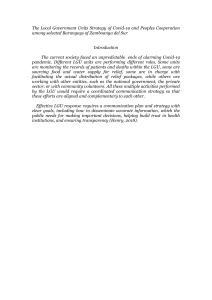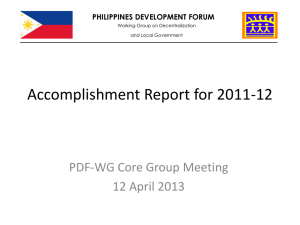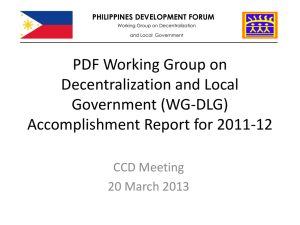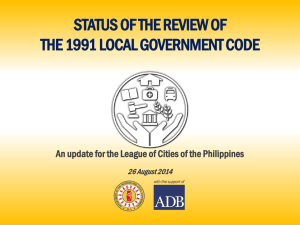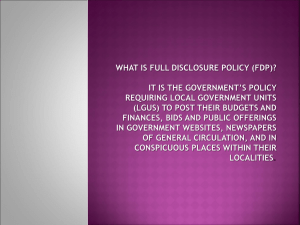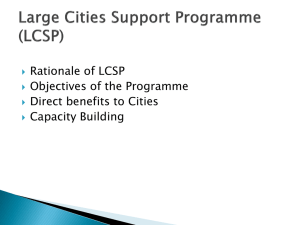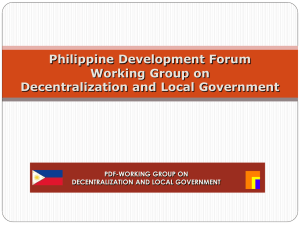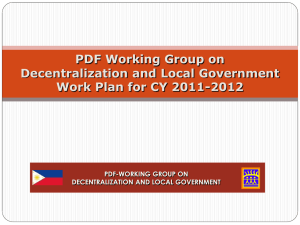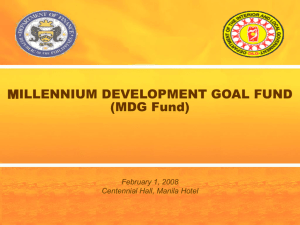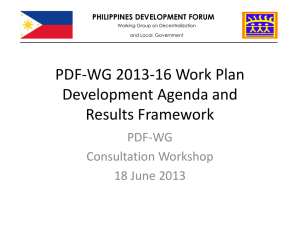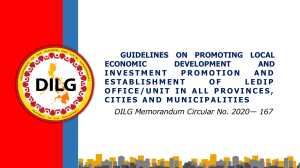Policy Agenda of the PDF-WG on Decentralization and Local
advertisement
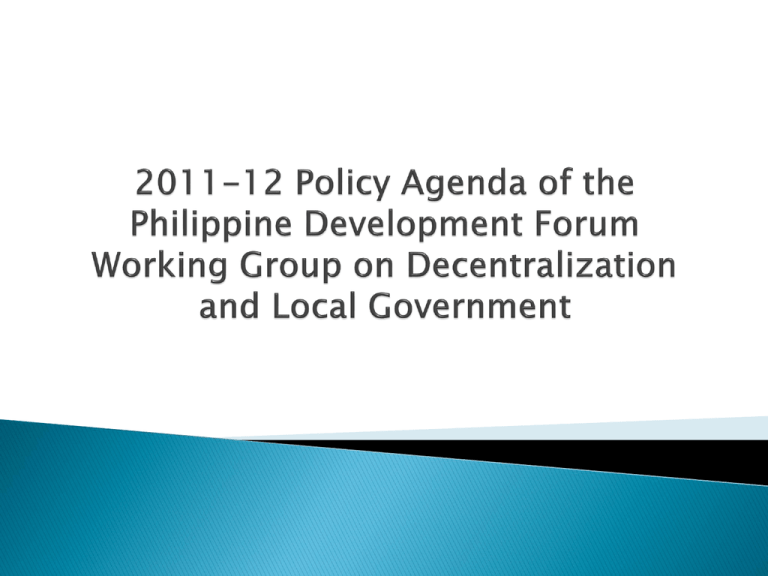
Theme of the 2013 Philippine Development Forum (PDF): “President Aquino’s Social Contract: Progress and Challenges in Achieving Inclusive Growth” All PDF working groups (WG) were requested to draft a 3-5 page progress report to: ◦ show the policy agenda pursued since the 2012 PDF; ◦ be used as inputs for discussing policy issues at the cluster level (i.e. for the breakout sessions) at the 2013 PDF. Emphasizes the role of the Filipino People as ◦ contributors to economic growth; and, ◦ the foundation of strong public institutions and policy To propel the Philippines to a path of inclusive growth it is important to ◦ Invest in human capital; and, ◦ Create an environment conducive to business and investment Development Agenda 1. Promoting Good Governance 2. Improve Fiscal Autonomy for Local Development 3. Accelerate Local Economic and Sustainable Development Aspect of the Social Contract Envisions public institutions rebuilt on the solidarity of Philippine Society and its communities Commitment to create an environment conducive to the growth and competitiveness of private businesses Promote transparency by helping the DILG institutionalize the Full Disclosure Policy (FDP): ◦ development of an FDP Portal; ◦ capacity building of civil society organizations to utilize the FDP reports and to engage in local special bodies; Promote accountability through policy that links incentives to performance such as: ◦ Seal of Good Housekeeping ◦ Performance Challenge Fund ◦ Local Government Performance Management System Policy reforms to improve service delivery in water and sanitation, local roads; Reforms in local government public financial management including efforts to integrate participatory mechanisms in local planning and budgeting through the Bottom-Up Budgeting (BUB) process. Efforts in: ◦ increasing own-source LGU revenues by strengthening capacity for tax and revenue administration; ◦ improved utilization of funds. Provide technical assistance and capacity building to national government (NG) oversight bodies to reform sub-national fiscal policies and systems for LGU fiscal reporting, analysis and oversight. Technical assistance to encourage investments has been provided to streamline business registration through a scaleup of business permit and licensing systems with the DTI and the WG on Growth and Investment Climate (GIC); through capacity building for inter-local cooperation; local investment promotion; and, disaster risk reduction and climate change adaptation. Development Agenda on Promoting Good Local Governance Outcome Meaningful engagement of people’s organizations in local governance Major Project/Activities Intensifying partnership with people’s organization (POs), CSOs and PS More transparent and accountable local operations Institutionalization of public disclosure Improved local government performance Implementation of Performance Challenge Fund (PCF) and institutionalization of incentive systems for local governance Strengthening LGU budget and accountability 2010 Newly Elected Officials Orientation Program Improved capacities of local chief executives Key Accomplishments Strengthening the capacity of CSOs to engage in local governance through local special bodies, promoting volunteerism and mapping and profiling of CSOs. Capacity development of civil society organizations to understand FDP Documents. Mainstreaming LGU compliance and widening public access to the Full Disclosure Policy through the FDP Portal (http:\\fdpp.dilg.gov.ph). Improved the institutional mechanism for the DILG to manage the PCF and providing continuous technical assistance and knowledge-sharing to strengthen the design and implementation of Incentive Systems for Local Governance and Performance. Supported reforms in local PFM through the Bottom-Up Budgeting process. Conducted a series of capacity building activities for newly-elected local chief executives. Development Agenda on Improving Fiscal Autonomy for Local Development Outcome Major Project/Activities Key Accomplishments Increased own- Development of local business Developed an operational plan and prototype source taxpayer database program for a taxpayer database. revenues Facilitating LGU compliance on Implemented policy on monitoring and More efficient allocation of expenditures Improved LGU fiscal management capacity updating of Schedule of Market Values (SMV) and collection of idle land tax Improving LGU utilization of funds Competency Certification Systems (CCS) for local treasurers Improving capacity of local treasurers and assessors on revenue generation and management Enhancement of local government unit fiscal reporting system consolidating the status of SMV revision and idle lands inventory. Developed and implemented policy on the utilization of: 1) Special Education Fund; and 2) 20% Local Development Fund. Development and implementation of guidelines of CCS. Capacity building of local treasurers and assessors. Development and roll-out of local treasurer’s manual. Added modules to the electronic Statement of Revenues and Expenditures (e-SRE): 1) fiscal capacity modelling and forecasting; 2) financing modalities; 3) debt management; and 4) creditworthiness and debt certification. Development Agenda on Accelerating Local Economic and Sustainable Development Outcome Streamlined business registration system Improved LGU capacity to encourage investments Disaster resilient LGUs and communities Key Accomplishments Major Project/Activities Up-scaling of business permit and licensing system (BPLS) Completed the streamlining of BPLS for 87% of target LGUs including capacity building for data collectors. Encouraging investments by supporting inter-LGU Alliances for local economic development Local investment promotion Mainstreaming disaster risk reduction and climate change in local governance Capacity building and technical support to inter-LGU alliances. Capacity building for DILG and NGAs to harmonize policies and coordinate programs for Local Economic Development. Capacity building for Local Economic and Investment Officers (LEIPOs) on investment promotion and competitiveness. Capacity building of LGUs for climate change adaptation and disaster risk reduction management.
